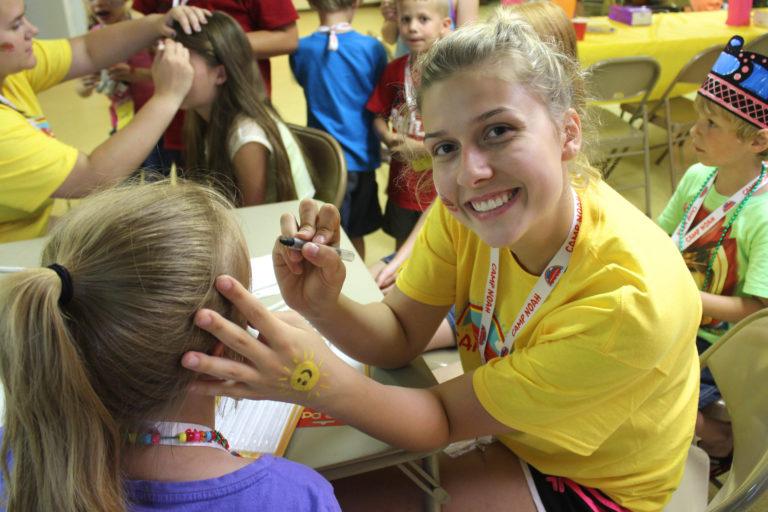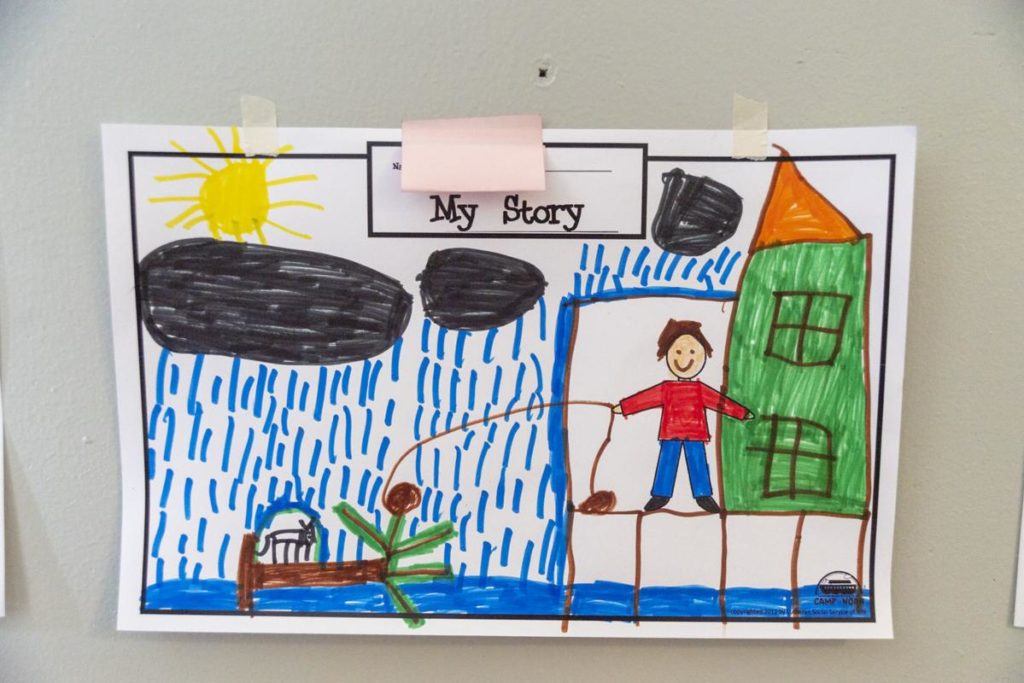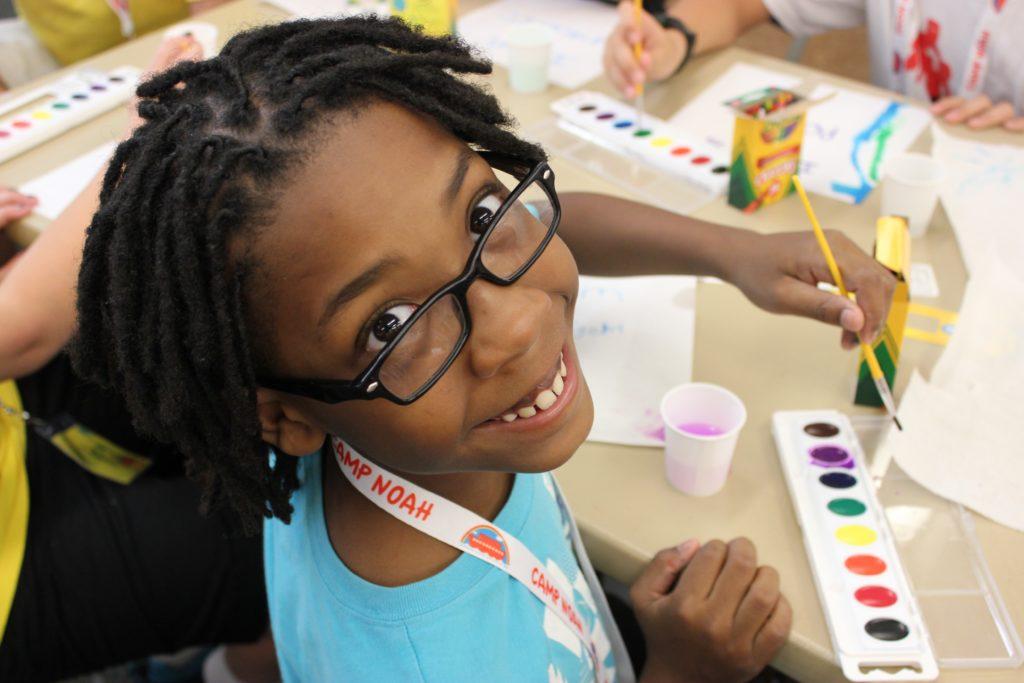Camp Noah

In 1997, the Red River between North Dakota and Northern Minnesota flooded to a level not experienced since 1826. Parents got to work filling out FEMA paperwork, communicating with insurance companies, finding temporary housing for their families and transportation to work, all while trying to keep food on the table. After the flood, teachers reported that kids were having trouble sleeping and experiencing nightmares. “What happens in the wake of natural disasters is that the kids aren’t forgotten, but their emotional needs may not be attended to because parents are so busy with recovery,” said Kim Dettmer, the Senior Director for Disaster Services and Camp Noah for Lutheran Social Service (LSS) of Minnesota.
“We teach children strategies and give them tools so they feel more in control when the next storm or disaster hits.”
Kim Dettmer, Senior Director for Disaster Services and Camp Noah
Long-Term Recovery from Disaster Trauma

The LSS program Kim directs, Camp Noah, was formed in 1997 in response to the Red River Flood. Over the past couple of decades, Camp Noah has grown to become a nationally recognized program helping children recover and develop new resiliency skills after their communities have been impacted by disaster and/or trauma. Since 1997, Camp Noah has been bringing hope and healing to those communities, ranging from those affected by Hurricanes Katrina and Sandy to the 2011 and 2013 tornadoes in Oklahoma and more recently responding to Hurricanes Harvey, Maria, and Florence. In total, Camp Noah has served 29 states and Puerto Rico.
Research shows that, due to their rapid rate of brain development, children are uniquely impacted by trauma and stress caused by events like these. However, most disaster relief is focused on basic needs and rebuilding infrastructure. There are fewer resources devoted to the long-term recovery phase of disaster recovery. “We typically go into communities 6-18 months after a disaster,” said Kim. “Right after a disaster, people are often in survival mode, but once an element of stability and routine are back in place and kids are in school, that’s when nightmares, lack of sleep, clinginess, anxiety, and other symptoms of trauma can be exhibited.”
Building Resiliency Skills to Prepare Youth

Even though Camp Noah comes in during the long-term recovery phase, it has always focused on both preparedness and resiliency. “We teach children strategies and give them tools so they feel more in control when the next storm or disaster hits,” Kim explained. The skills kids gain over five days at Camp Noah – how to calm themselves, visualization exercises that help with relaxation, taking steps to move from being scared to feeling prepared – are applicable for trauma and stress that aren’t exclusively related to natural disasters. “When you look at what’s going on in our communities related to gun violence and what happened in Flint, Michigan, with the water crisis, we discovered that a lot of the skills we teach through our traditional program can be effective in other traumatic situations,” said Kim.
Strategic Pivot for Ensuring Sustainability
While the Camp Noah staff had already made some adaptations to its curriculum to make it applicable for a range of trauma-inducing events, Kim knew it was time for a full strategic planning process. “The episodic nature of disasters, and therefore of funding for disaster response, led us to realize that we needed to figure out how to do more year-round programming,” said Kim, who noted that most of the program’s current work takes place in the summer when they host their camps. She reached out to Propel Nonprofits in the summer of 2019 to start working on a plan that would allow Lutheran Social Service to sustain this important program year-to-year.
“Honestly, I thought there would be a magic bullet out there,” admitted Kim. “But, one of my a-ha moments working with Mario [Hernandez, Strategic Services Director at Propel] was realizing there was no one magic bullet, and that the answers really lie within us.” Another insight was differentiating the cost of programming and the price communities can pay, since the gap between the two is where additional funds are needed, and there are few options for longer-term funding contracts for this work.

Given a need to move beyond episodic programming and funding, the Camp Noah team focused on how to expand its disaster preparedness work by offering new, year-round products, and in turn building a stronger ambassador network to market its services. It will still maintain its core work in the recovery phase through its summer programming; however, Camp Noah’s new products reflect a shift from seeing camps as its principal value proposition to seeing its trauma healing curriculum as its primary, unique value offering that can also provide more year-round sustainability.
The next step was to figure out a financial strategy to help Camp Noah make the pivot from the summer camp-model to more consistent trauma-response programming. The Camp Noah team had a lot of ideas and wanted to start trying things out, while still keeping services affordable. They needed a strategy that balanced both. “I really appreciated that Mary Ann [Ehlshlager, Senior Financial Consultant at Propel] laid out our financial analysis in a very clear, planful manner that will ensure success,” said Kim. “I realized that, ‘This is exactly how LSS thinks.’”
In the end, Camp Noah is moving forward with a plan that has clear strategic goals that are backed with a financial roadmap. “I just feel so much better knowing we’re on the right track, Kim said. “Propel was able to assist us in finding ways to make our ideas a reality, and do it in a very sensible way, not only in terms of human resources but also in a way that makes financial sense.”
To learn more about Lutheran Social Service of Minnesota’s Camp Noah, visit its website: https://www.lssmn.org/campnoah/.
Photos courtesy of Camp Noah
Related Services
-
Strategic Consulting
As a leader, you want to make sure your organization has a shared vision for the future, and the strategy to get there. Propel Nonprofits’ consultants are experienced at providing strategic planning, board development, and other strategic services to organizations
